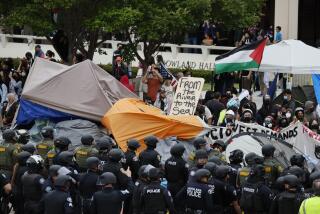Fireworks, drones, Travis Scott hats: USC hosts alternative graduation event. Feelings are mixed
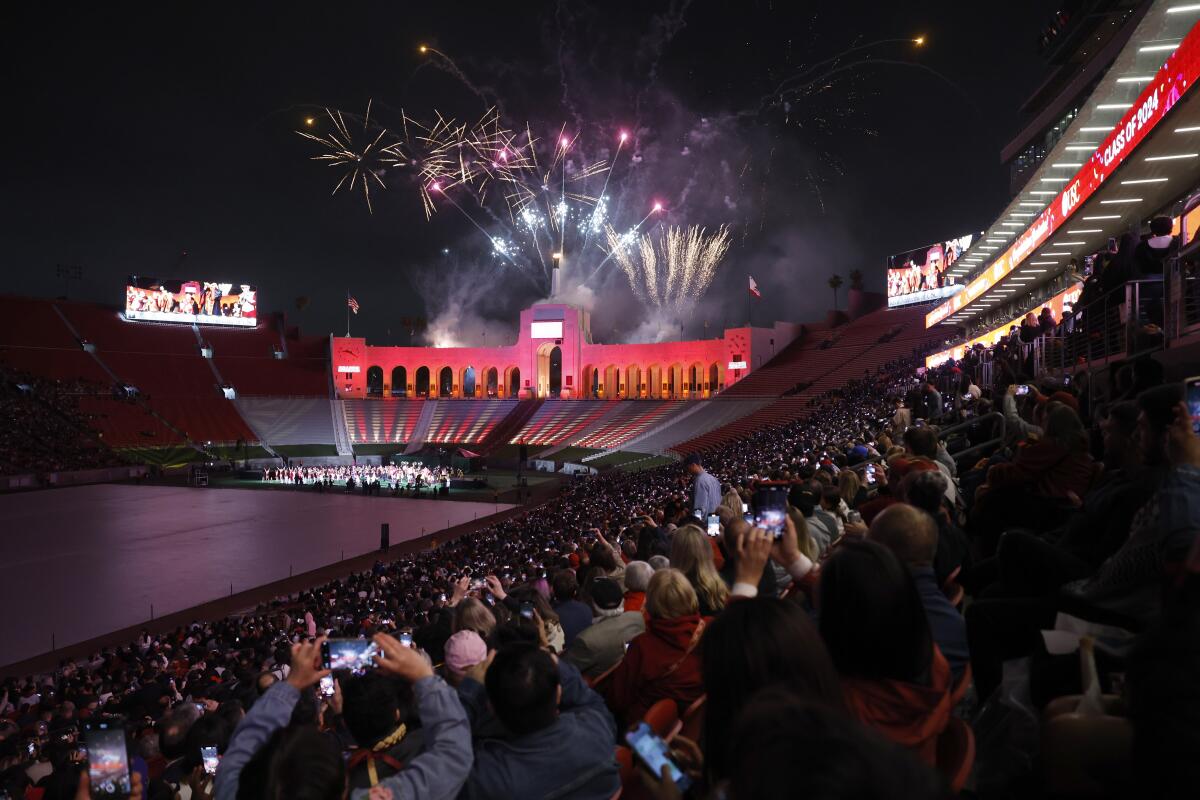
No valedictorian speech. No celebrity speakers. No main-stage ceremony, and no massive graduate walk to “Pomp and Circumstance” before tens of thousands of guests.
Instead, USC’s graduating seniors — whose traditional main graduation ceremony was canceled — were thrown an alternative party Thursday night: a “Trojan Family Graduate Celebration” at Los Angeles Memorial Coliseum on the eve of smaller campus commencement ceremonies where diplomas were set to be awarded at individual school events.
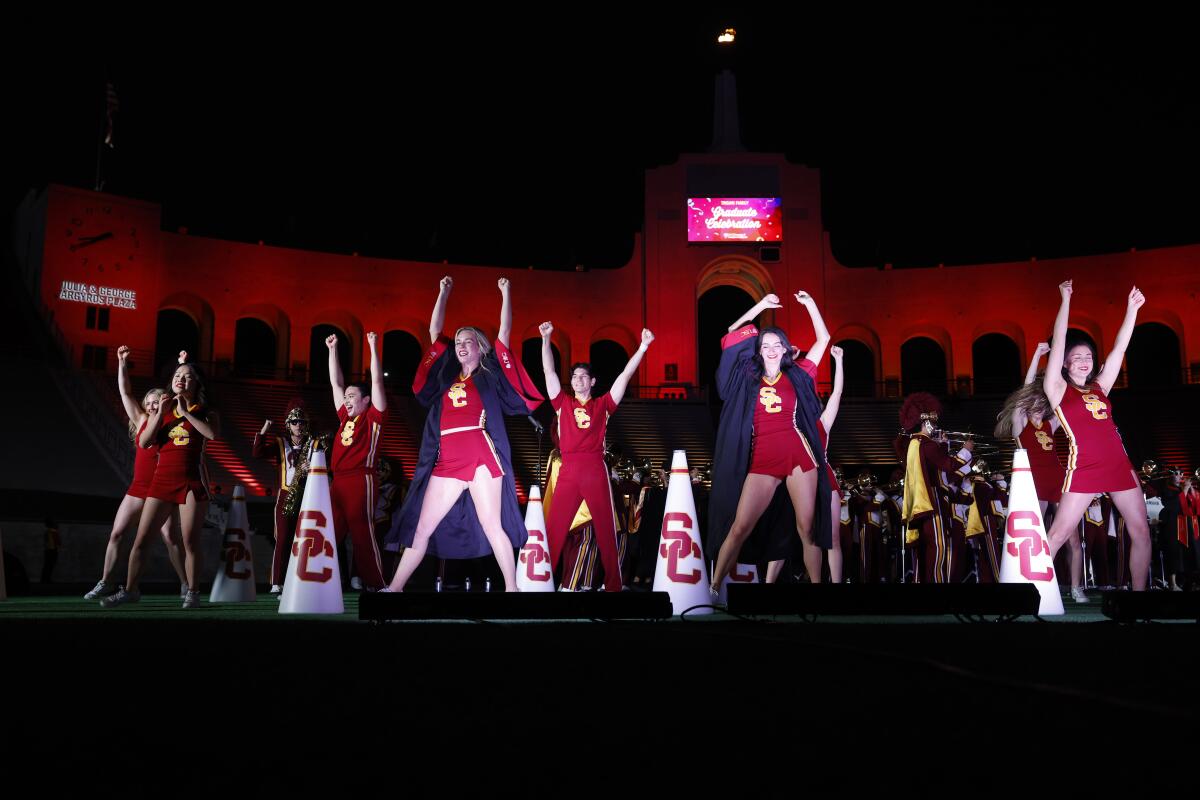
The Thursday night event was billed as an “electric atmosphere” — capped at six tickets per grad — featuring a drone show, fireworks and a “special gift” for the Class of 2024: a hat from rap star Travis Scott’s collegiate clothing brand.
The university had pitched the event as a “Southern California-style” celebration to compensate for the loss of the main-stage ceremony with a valedictorian, keynote speeches and the presentation of honorary degrees. But turmoil and campus protests over the Israel-Hamas war upended that ritual.
Thia Broido, a graduating senior who sat on a top row at the Coliseum with her parents and brother Thursday night, said she was saddened by the controversial cancellation of the main commencement.
Her high school commencement was upended by the start of the COVID-19 pandemic, with the graduation stage replaced by a “super cute” drive-in ceremony and social distancing, she said.
For her college graduation, she was glad to have the family-friendly event at the Coliseum, but she said it didn’t “remove anything that has happened” over the last few weeks.
“I don’t want to be a downer about it,” Broido said. “I’m happy for what we have. But what USC is doing is ongoing, and I can’t forget about that.”
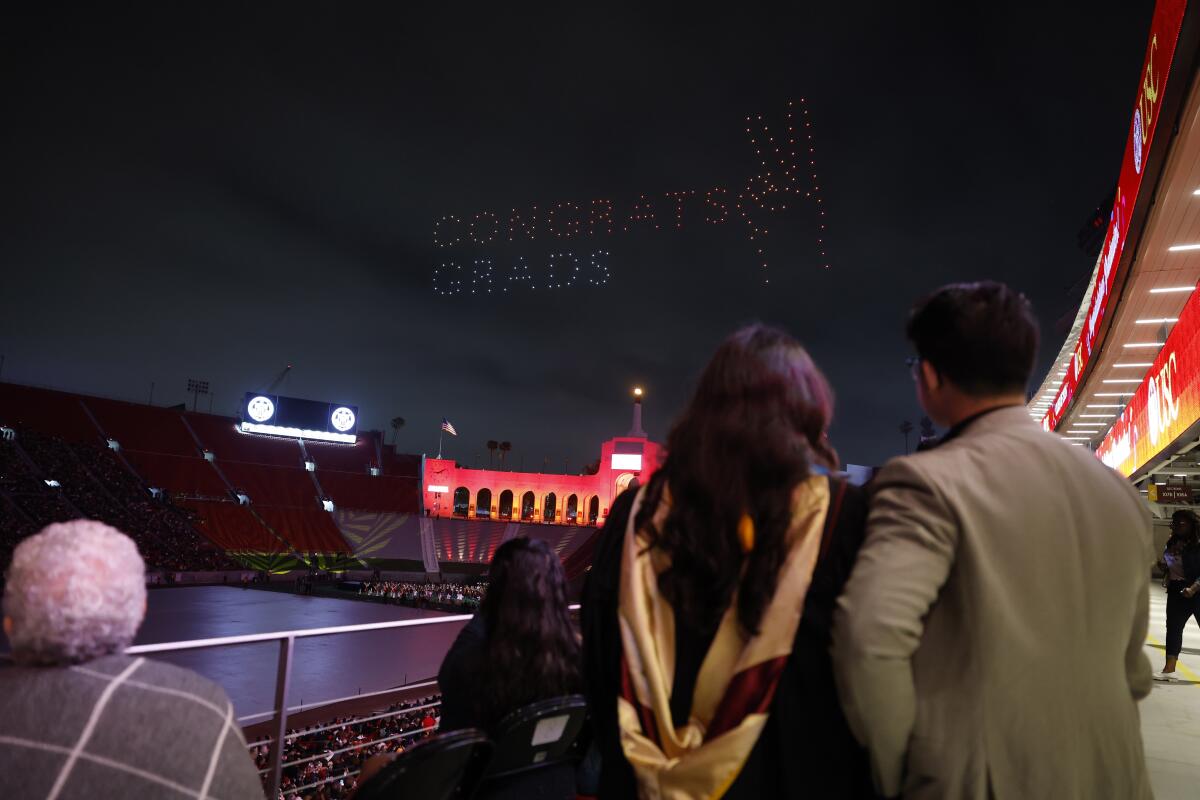
How USC’s controversial decision on Asna Tabassum’s valedictorian speech led to nearly two weeks of campus tension with 93 arrests and a canceled ‘main stage’ commencement.
Citing unspecified safety threats, USC President Carol Folt last month rescinded pro-Palestinian valedictorian Asna Tabassum’s speaking slot and then canceled the main ceremony. After students set up a pro-Palestinian tent encampment and demanded that USC end its financial ties with Israel, Folt and her team called in the Los Angeles Police Department, and 93 people were arrested. On Sunday morning, police cleared a second encampment, but no arrests were made.
On Wednesday, Folt and Provost Andrew Guzman were censured by the Academic Senate, a body of representatives for USC faculty. The members cited “widespread dissatisfaction and concern among the faculty about administrative actions and decisions surrounding protests and commencement.”
Folt has defended her actions, and said in an interview with The Times that campus safety is her “North Star.”
“For me, I have a very clear North Star: that I am the person at the university, no matter how complicated the issue and how much I empathize with everybody involved — which has been true for me — I still in the end have to sit back and say, ‘What can I do to keep my campus and my people as safe as possible?’ ”
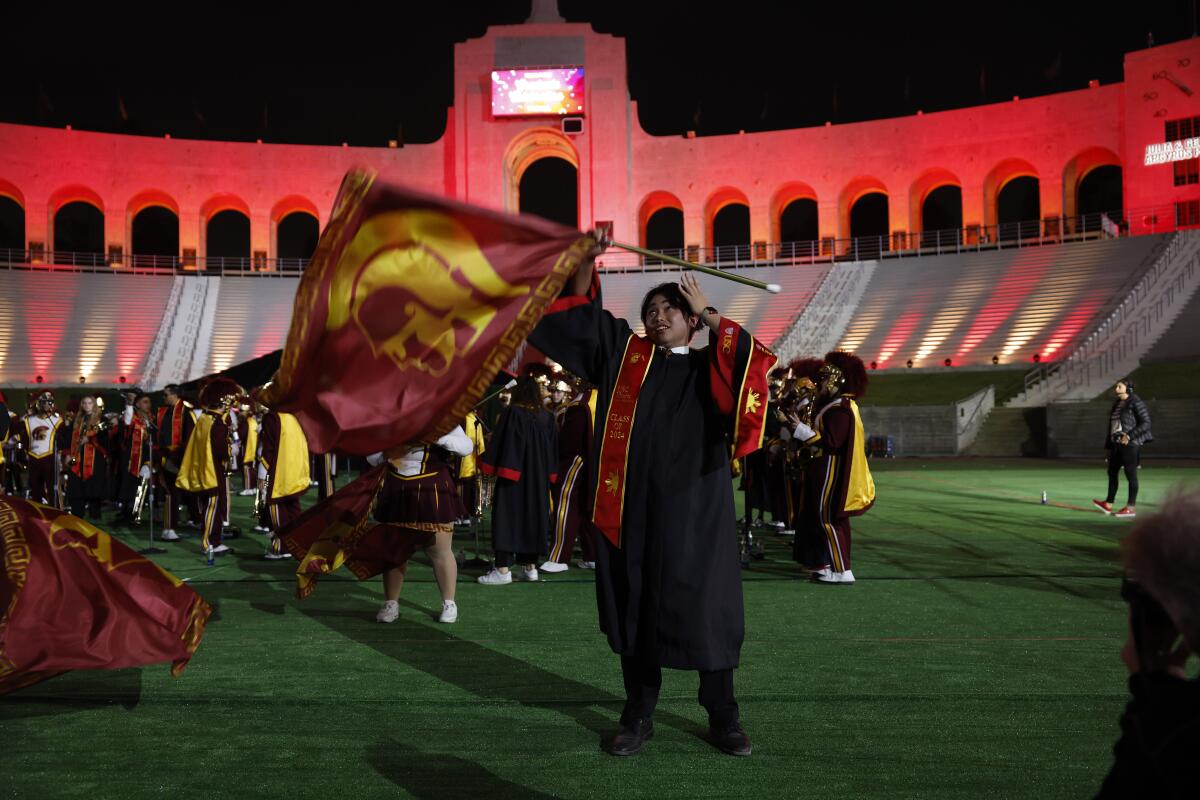
Typically, the annual Baccalaureate Ceremony — a nondenominational, interfaith celebration — is held on the eve of graduation at Bovard Auditorium in the center of campus. This year, there was an “in-person blessing” for the Coliseum bash, as well as an “online interfaith blessing” that could be viewed on a commencement website.
During the Student Recognition Awards Ceremony on Thursday afternoon, students clad in graduation gowns cheered at length when Tabassum was recognized. She laughed and pretended to check her watch as the applause continued.
“You may not know this,” the announcer joked, “but Asna is USC’s 2024 valedictorian.”
Her classmates then gave her a standing ovation.
A cascade of decisions that Folt made this spring around USC’s commencement and Israel-Hamas war-related protests inflamed tensions and opened wounds, presenting the most significant test of her tenure.
Security at the Coliseum leading up to commencement has been tight.
On Thursday, access to USC’s campus, which was already restricted to the university’s students, faculty, staff and registered guests, became even stricter. Students and staff had to show USC identification, and anyone else trying to access campus needed a commencement ticket.
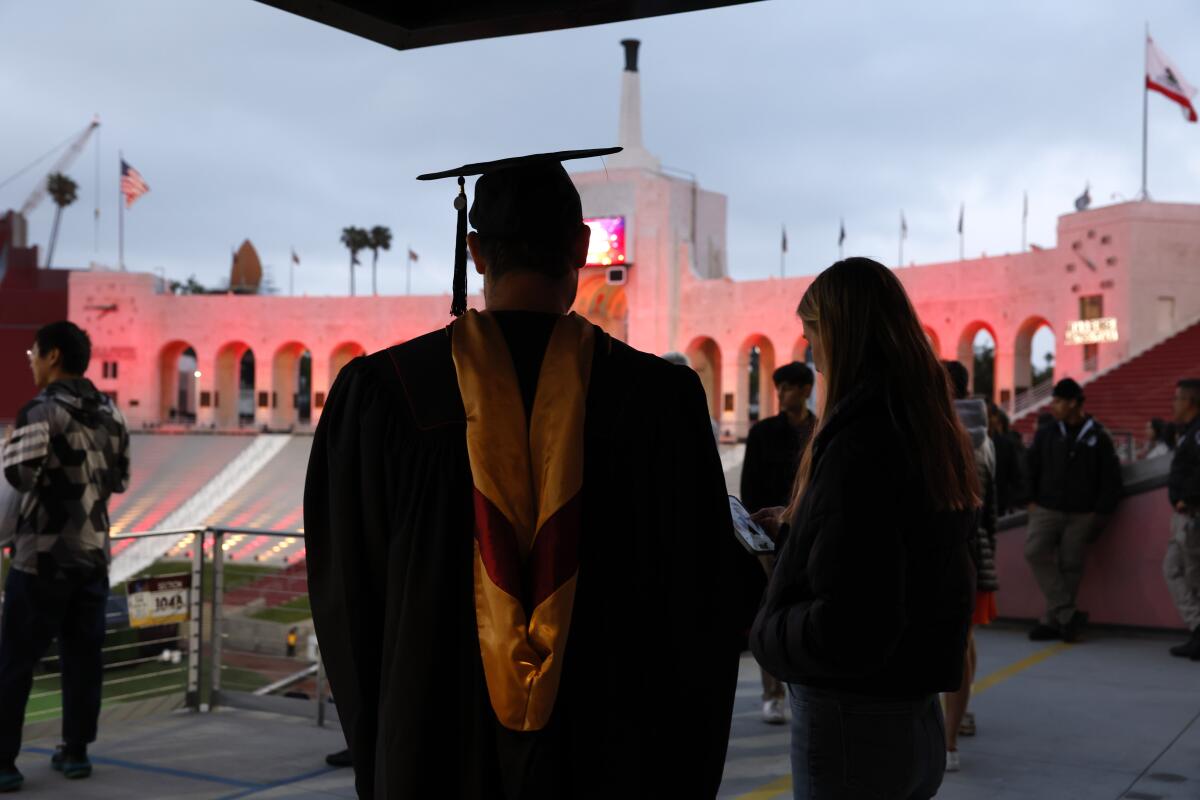
Metal fences and black gates were posted around campus. Guests walked through metal detectors and were asked to carry clear purses or bags. Since the Sunday encampment sweep, officers from several law enforcement agencies have been stationed at the center of the USC campus.
They included officers from the Baldwin Park Police Department, La Habra Police Department, Los Angeles Police Department and Los Angeles Airport Police, according to David Carlisle, assistant chief of the university’s Department of Public Safety.
Officers were stationed near the Tommy Trojan statue, which had been cleaned after a protester — who organizers of the student encampment said was not affiliated with them — spray-painted “Stop Genocide” on its plaque.
No demonstrations disrupted Thursday night’s event, although speakers and attendees acknowledged the tense campus climate.
Inside the Coliseum, deejay duo Phantogram took the stage at 7:45 p.m. for a set before a sparse crowd of about 350. But attendance had grown substantially by the time the event began about 45 minutes later.
A campus spokesperson said more than 22,000 people attended.
Broido, the graduating senior, said she thought it was odd that the university would give out the Travis Scott hats — black caps with the words “USC Alumni” — which were distributed at a tent. She said she stopped being a fan of the rapper after 10 people were killed in a crowd crush at the 2021 Astroworld music festival in Houston.
“I think it’s ironic that USC would partner with him,” Broido said. “I like his music — it’s just mixed feelings.”
Varun Soni, dean of religious life at the university, delivered the invocation — a tradition typically held during the main-stage commencement.
“There are so many in our community who are wrestling with anger and grief,” he said.
The world, he said, is gripped by “five major crises” — war, justice, health, sustainability and joy.
“We have a full-blown crisis of joy,” he said.
The evening’s event, he said, was about celebrating the graduates and giving joy when it is needed the most.
A series of video messages were projected on a large screen, including remarks by late-night host Jimmy Kimmel.
“This class,” he said, “has been through a lot. More than other classes have had to deal with.”
When the event concluded, the words “Class of 2024” and “Fight On!” were spelled in the sky by drones with red and white lights.
Jack Callahan, who was decked out in USC gear, flew out with his family from Buffalo, N.Y., to watch his daughter Kiera graduate. Callahan was glad the university hosted a “big event to celebrate the graduates” after the family was initially disappointed to learn about the main-stage commencement’s cancellation.
“I loved the camaraderie, the spirit and the drone show,” Callahan said. His wife, Liza, was equally thrilled with the drones, which she called “absolutely amazing.”
“When we graduated,” she said, “there was nothing like that. Technology has come so far.”
But Kiera, who studied psychology, would have preferred the real graduation.
“I thought it was cute,” she said. “It was nice that they did something. But it doesn’t replace commencement.”
Times photographer Gina Ferazzi contributed to this report.
More to Read
Sign up for Essential California
The most important California stories and recommendations in your inbox every morning.
You may occasionally receive promotional content from the Los Angeles Times.




